Summary
The following side events were covered by ENBOTS on Thursday, 8 June 2017:
- Building Ocean Knowledge for Sustainable Development
- Can We Achieve SDG 14 Without Looking Upstream? Starting at the Source to Save the Sea
- Addressing Oceans and Climate and Building the Blue Economy: Essential to SDG 14 Implementation
- Blue Biotrade: Harnessing Trade and Investment for Sustainable Use
- Advancing SDG 14 and the Quest for a Blue Economy through the Promotion of Socio-economic Benefits for Developing Countries, Including SIDS, and Increasing Scientific Knowledge and Research Capacity: Perspectives on Deep Seabed Mining
- Financing Ocean Sustainable Development: The Investment Community and SDG 14
IISD Reporting Services, through its Earth Negotiations Bulletin on the Side (ENBOTS) Meeting Coverage, is providing daily web coverage of selected side events at the Ocean Conference.
Photos by IISD/ENBOTS | Francis Dejon and Brad VinceletteFor photo reprint permissions, please follow instructions at our Attribution Regulations for Meeting Photo Usage Page
Building Ocean Knowledge for Sustainable Development
Presented by the Intergovernmental Oceanographic Commission of UNESCO (IOC-UNESCO) and the Permanent Missions to the UN of Samoa, Norway, and Maldives
Delivering opening remarks, Tuilaepa Lupesoliai Neioti Aiono Sailele Malielegaoi, Prime Minister of Samoa, underscored the role of science, technology and innovation (STI) in: addressing loss and damage, mitigation and adaptation in the context of climate change; improving livelihoods; and ensuring Ocean health. He stressed that STI is an integral part of the means of implementation for the SDGs, and thus a priority for member states.
Tone Skogen, State Secretary, Norway, said her country was one of few to have established research policies for sustainable development, underscoring the Ocean as a priority. She stressed the need for developing human resources in Ocean science, explaining its key role in ensuring a healthy Ocean to achieve “the Future We Want.”
Mohamed Shainee, Minister of Fisheries and Agriculture, Maldives, said only through research and knowledge sharing will we be able to cope with, and adapt to, changing manmade and natural environments. He underscored the need to improve our capacity to collect relevant data.
Irina Bokova, Director-General, UNESCO, underlined that 3,000 people had climbed Everest and 12 people walked on the moon, but only very few have explored the deep Ocean, which represents 90% of Earth’s habitat space. On the Global Ocean Science Report, she said it provides, inter alia, a call to action for governments to start funding the operationalization of the International Union for the Conservation of Nature (IUCN) Criteria and Guidelines on the Transfer of Marine Technology.
Luis Valdes, UNESCO, presented several key findings of the Report, including: global Ocean science is “big science” and is multidisciplinary; there is more gender balance in Ocean science than in science overall; and Ocean science expenditure is highly variable worldwide and benefits from alternative funding.
Zakri Abdul Hamid, Science Advisor to the Prime Minister of Malaysia, stressed the need to align educational systems with the SDGs and highlighted the role of multi-stakeholder collaborations that engage national science councils in the operationalization of the 2030 Agenda for Sustainable Development. He said investments in Ocean science are assets because of the vital findings they bring.
Ariel Troisi, Servício de Hídrografia Naval, Argentina, underscored the need for member states to include the transfer of marine technology in their national strategic plans. He expressed support for designating 2021-2030 as the International Decade of Ocean Science for Sustainable Development, arguing that it would encourage, inter alia, transdisciplinary and integrated research.
Peter Haugan, IOC Chairperson, Proposal for an International Decade of Ocean Science for Sustainable Development, said the preliminary objectives of the Decade include: stimulating a global partnership on the marine science requirements needed to support the implementation of the 2030 Agenda; and understanding the impacts of cumulative stressors and seeking sustainable solutions for maintaining benefits from the Ocean.
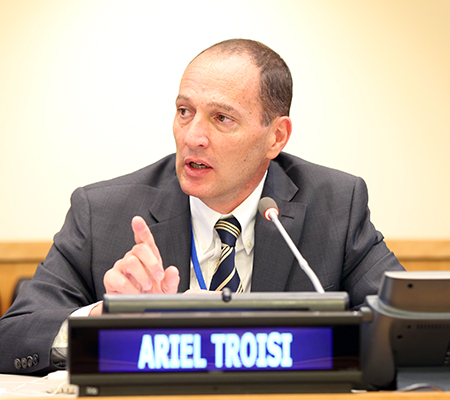
Ariel Troisi, Servício de Hídrografia Naval, Argentina, underscored the need for member states to include the transfer of marine technology in their national strategic plans.
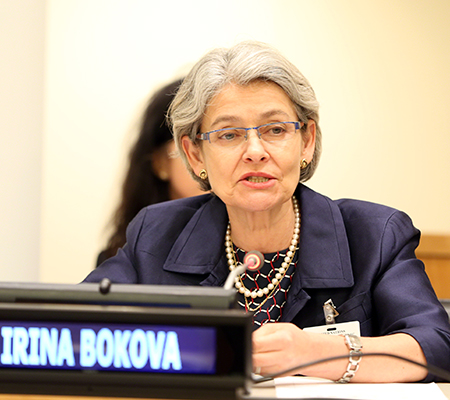
Irina Bokova, UNESCO Director-General, said the Ocean needs better public policies and stronger international collaboration.
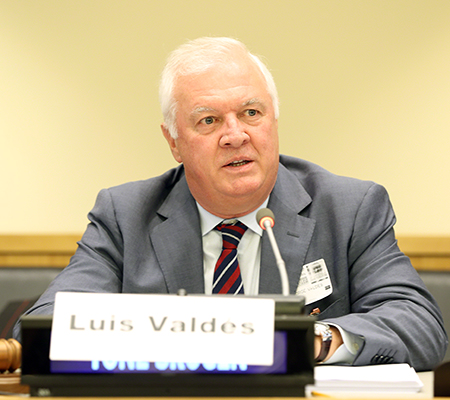
Luis Valdes, GOSR Coordinating Editor, presented several key findings of the Report.
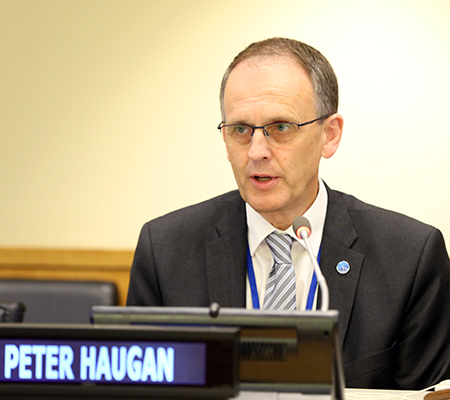
Peter Haugan, IOC Chairperson, Proposal for an International Decade of Ocean Science for Sustainable Development, presented the preliminary objectives of the proposed Decade.
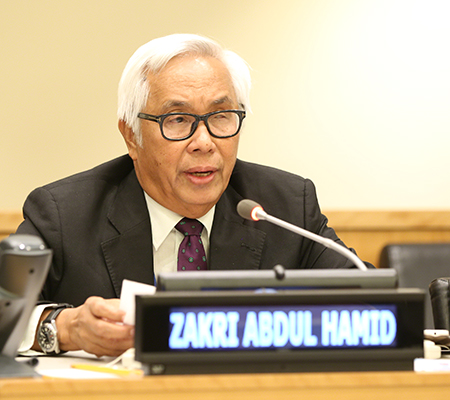
Zakri Abdul Hamid, Science Advisor to the Prime Minister of Malaysia, said key investments in Ocean science are assets because of the vital findings they bring.
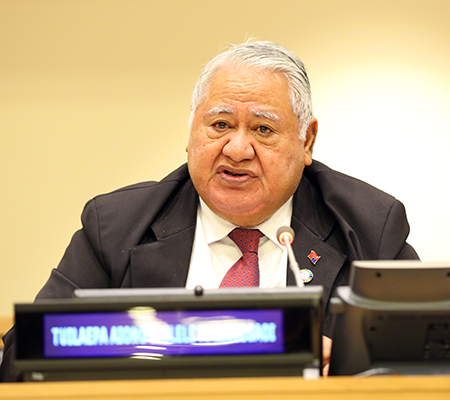
Tuilaepa Lupesoliai Neioti Aiono Sailele Malielegaoi, Prime Minister of Samoa, called for building our Ocean knowledge for sustainable development through STI.
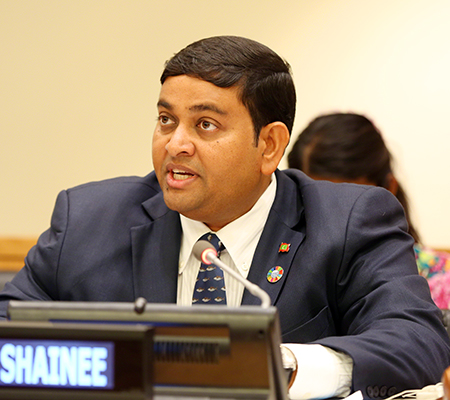
Mohamed Shainee, Minister of Fisheries and Agriculture of Maldives, said only through research and knowledge sharing we will be able to cope with and adapt to the changing manmade and natural environments.
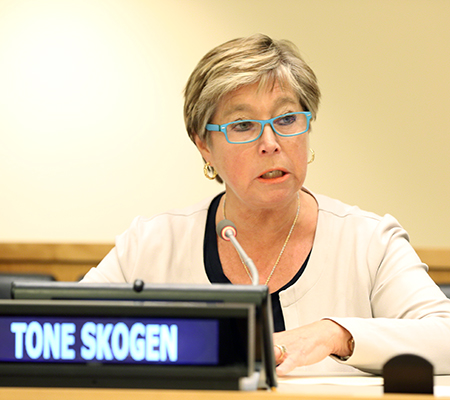
Tone Skogen, State Secretary of Norway, said we need a healthy Ocean to achieve the Future We Want and this will not be possible without Ocean science.

Panel (L-R):
Irina Bokova, Director-General, UNESCO;
Vladimir Ryabinin, Executive Secretary, UNESCO-IOC;
Mohamed Shainee, Minister of Fisheries and Agriculture, Maldives;
Tone Skogen, State Secretary, Norway; and
Tuilaepa Lupesoliai Neioti Aiono Sailele Malielegaoi, Prime Minister, Samoa.

Panel (L-R):
Vladimir Ryabinin, Executive Secretary, UNESCO-IOC;
Peter Haugan, Chairperson, UNESCO-IOC;
Luis Valdes, UNESCO;
Ariel Troisi, Servício de Hídrografia Naval, Argentina; and
Zakri Abdul Hamid, Science Advisor to the Prime Minister, Malaysia.
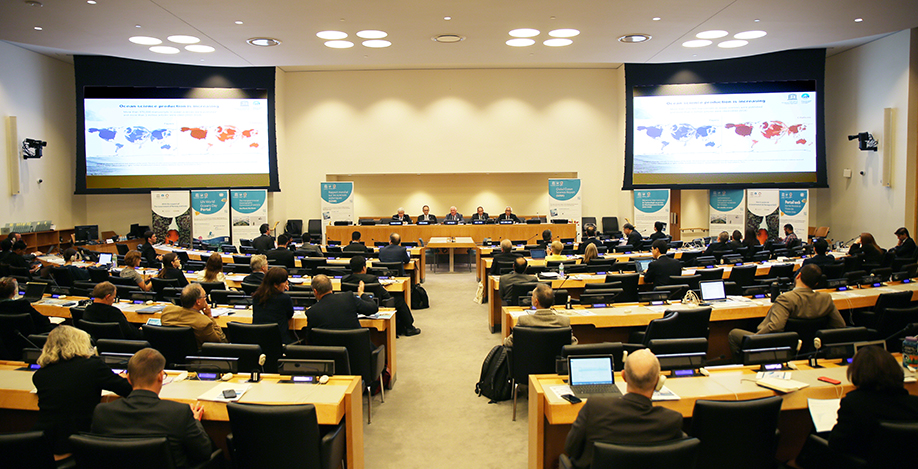
Contacts:
- Hellin Brink (UNESCO New York Office) | h.brink@unesco.org
More Information:
Can We Achieve SDG 14 Without Looking Upstream? Starting at the Source to Save the Sea
Presented by Government of Sweden and the Swedish Agency for Marine and Water Management (SwAM), Indian Ocean Commission (IOC), Stockholm International Water Institute (SIWI)/Action Platform on Source to Sea Management (S2S Platform), the Government of Germany, Swedish Chemicals Agency (KEMI), Swedish Meteorological and Hydrological Institute
Jakob Granit, Director General, SwAM, moderated this event.
Raj Mohabeer, IOC, said concrete steps to address upstream sources of marine pollution need to go “further and faster.” Karolina Skog, Minister for the Environment, Sweden, cited HELCOM as an example of a successful regional effort to address source-to-sea (S2S), saying the EU can build on and enhance existing measures.
Barbara Hendricks, Federal Minister for Environment, Nature Conservation, Building and Nuclear Safety, Germany, highlighted the G20 Action Plan on marine litter. She urged work on helping countries worldwide to adopt functional waste management and wastewater treatment systems.
Didier Dogley, Minister of Environment, Energy and Climate Change, Seychelles, noted that the size and nature of SIDS make the case for S2S clear. He described examples from his country, including innovative financing such as debt-for-nature swaps and blue bonds, as well as regional collaboration in the context of the Nairobi Convention and IOC.
Daryl Vaz, Minister without Portfolio in the Ministry of Economic Growth and Job Creation with responsibility for Land, Environment, Climate Change and Investments, Jamaica, said SIDS like Jamaica , which depend heavily on marine resources must take a systemic approach to protect their ecosystem capital, adding that his country is looking at upstream aspects affecting achievement of SDG 14.
Naoko Ishii, CEO and Chairperson, Global Environment Facility (GEF), said the GEF has become convinced of the need to break silos and look at problems holistically, and would be featuring an S2S approach in its next replenishment.
Carl Gustaf Lundin, IUCN, focused on the issue of microplastics in oceans, noting that people are waking up to the danger. He cautioned, however, that banning microplastics in cosmetics will not solve the problem alone, since a much larger proportion come from tires, roads, paints, "city dust" and washing clothes.
Torkil Jonch Clausen, Chair, S2S Platform, said the Ocean community needs to get more involved in the freshwater agenda; cross-thinking should be encouraged for indicators for SDG 6 (on water) and SDG 14; and integrated water resource management should be linked to integrated coastal zone management.
Emma Nohrén, Swedish Green Party, stressed that a lot marine pollution comes from things we do not see, such as runoff, eutrophication and even pharmaceuticals flushed into sewers. She suggested the sea is a mirror of our lifestyles, so many of the problems will require lifestyle changes.
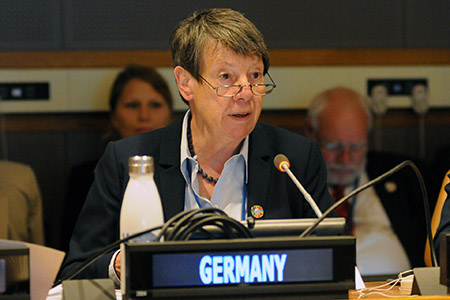
Barbara Hendricks, Federal Minister for Environment, Nature Conservation, Building and Nuclear Safety, Germany, called for helping all countries set up functional waste management and wastewater treatment systems.
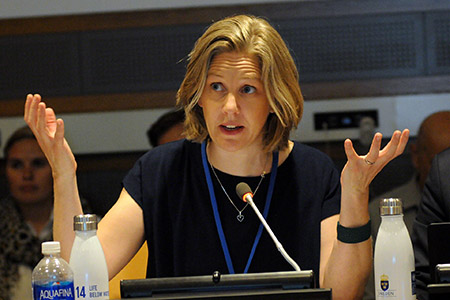
Karolina Skog, Environment Minister, Sweden, announced €1.5 million contribution to S2S Platform and UNEP’s work on land-based sources of marine pollution.
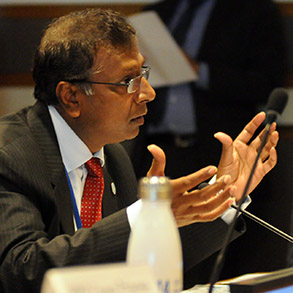
Raj Mohabeer, IOC, suggested that the S2S Platform develop a global monitoring tool so that countries can assess whether progress on S2S is actually being made.
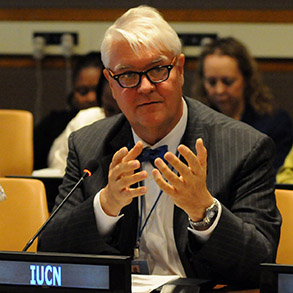
Carl Gustaf Lundin, IUCN, pointed out that cosmetics are the source of only 2% of microplastics entering oceans.
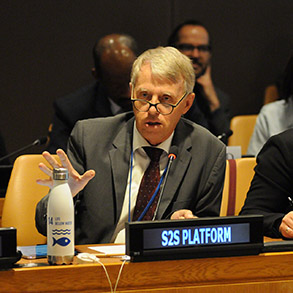
Torkil Jonch Clausen, Chair, S2S Platform, said countries need to link integrated water resource management with integrated coastal zone management.
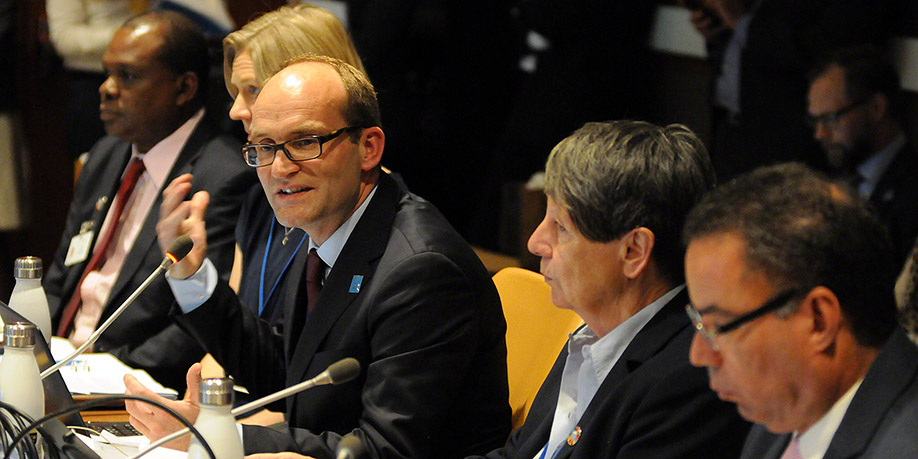
Jakob Granit, Director General, SwAM, moderated the event.
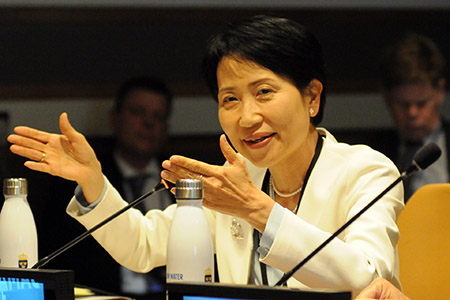
Naoko Ishii, CEO and Chairperson for the GEF, said S2S will feature in the GEF’s next replenishment.
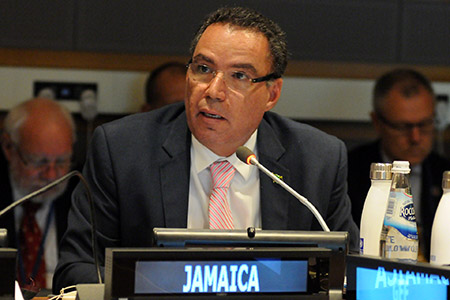
Daryl Vaz, Minister without Portfolio, Jamaica, described his country’s efforts to address land-sea environment linkages.
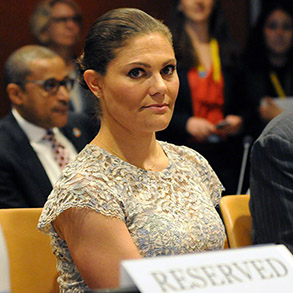
Crown Princess Victoria of Sweden
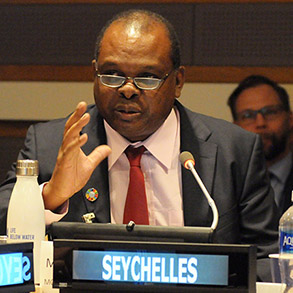
Didier Dogley, Minister of Environment, Energy and Climate Change, Seychelles, said size and nature of SIDS made the need for a S2S approach clear.
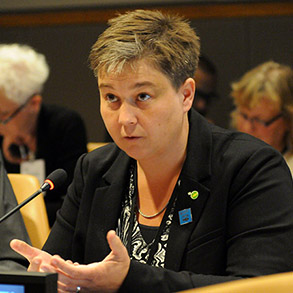
Noting “The sea is a mirror of our lifestyle,” Emma Nohrén, Swedish Green Party, pointed out that solving the marine pollution problem will require addressing many lifestyle factors.

Panel (L-R):
Karolina Skog, Environment Minister, Sweden;
Jakob Granit, Director General, SwAM;
Barbara Hendricks, Federal Minister for Environment, Nature Conservation, Building and Nuclear Safety, Germany;
Daryl Vaz, Minister without Portfolio, Jamaica;
Naoko Ishii, CEO and Chairperson, the GEF;
Torkil Jonch Clausen, Chair, S2S Platform; and
Emma Nohrén, Swedish Green Party.
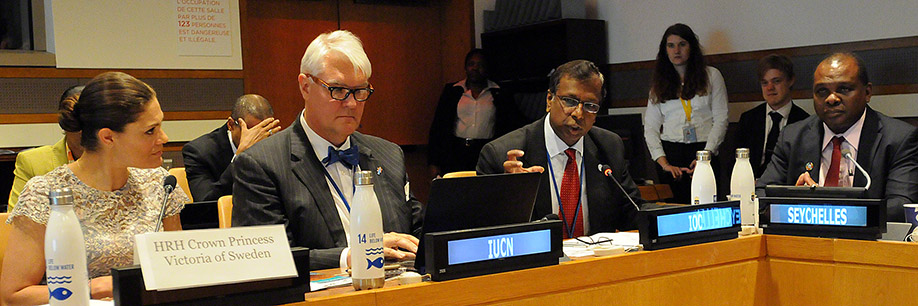
Panel (L-R):
Crown Princess Victoria of Sweden;
Carl Gustaf Lundin, IUCN;
Raj Mohabeer, IOC; and
Didier Dogley, Minister of Environment, Energy and Climate Change, Seychelles.
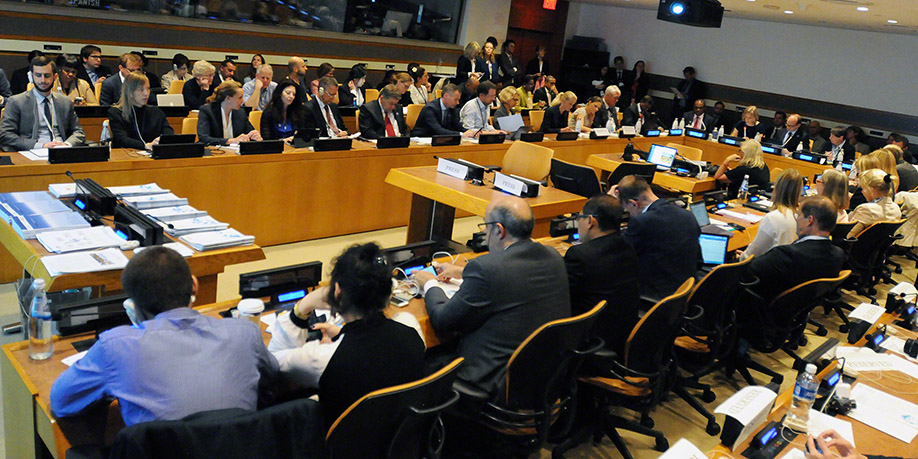
Contacts:
- Ulrika Siira (SwAM) | ulrika.siira@havochvatten.se
More Information:
Addressing Oceans and Climate and Building the Blue Economy: Essential to SDG 14 Implementation
Presented by the Global Ocean Forum (GOF), together with IOC-UNESCO, Oceano Azul Foundation, Sasakawa Peace Foundation (SPF), Ocean Policy Research Institute (OPRI), and the Governments of Grenada, Japan and Seychelles
Biliana Cicin-Sain, President, GOF, moderated this event. She provided a brief overview of the Roadmap to Oceans and Climate Action, unveiled at COP 22.
Event Co-Chairs Angus Friday, Ambassador of Grenada to the US, and Ronald Jumeau, Permanent Representative of Seychelles to the UN, stressed the importance of climate change, oceans and the Blue Economy to SIDS.
Naoko Ishii, CEO and Chairperson, GEF, expressed the GEF's interest in forming a multi-stakeholder platform to create a coherent framework for addressing the nexus of climate, Oceans and the Blue Economy that would include private sector partners.
Álvaro Mendonça e Moura, Permanent Representative of Portugal to the UN and Co-Facilitator, Preparatory Meeting for the Ocean Conference, praised having the reference to Blue Economy in the Call to Action.
Inia Seruiratu, Minister for Agriculture, Rural Development and Natural Disaster Management, Fiji, underscored the importance of “alignment and integration” in addressing Ocean health and climate change.
Kees Rade, Ambassador for Sustainable Development, Netherlands, discussed Dutch efforts to share experiences and build capacity in climate change adaptation and disaster risk reduction.
Tiago Pitta e Cunha, CEO, Oceano Azul Foundation, Portugal, stressed the importance of developing a vision for a Blue Economy that convinces industry of the need for decoupling economic growth from ocean degradation.
Charles Goddard, Economist Intelligence Unit, suggested that the key to financing the transition to a more sustainable Ocean economy is to increase awareness of the economic exposure and financial risk posed by what climate change is doing to the oceans.
Vladimir Ryabinin, Executive Secretary, IOC-UNESCO, characterized the inclusion of Oceans reference in the Paris Agreement as “a modest success” that must be built upon by finding financing, funding research, developing new tools and forging new partnerships.
Wenjian Zhang, Assistant Secretary-General, World Meteorological Organization (WMO), urged investment in Ocean research and subsurface Ocean observations systems.
Stuart Chape, Secretariat of the Pacific Regional Environment Programme (SPREP), warned that the Paris Agreement is not going to reverse all the Ocean’s damage set in motion in recent decades.
Yoshihisa Shirayama, Executive Director, Japan Agency for Marine-Earth Science and Technology (JAMSTEC), discussed the impact of Ocean acidification on Japanese reefs.
Adrian Ross, Executive Director, Partnerships in Environmental Management for the Seas of East Asia (PEMSEA), Philippines, stressed the need to include local governments in building the Oceans-climate agenda.
Hashali Hamaukuaya, Executive Secretary, Benguela Current Commission, and Chairman, African Large Ecosystems Caucus, described climate change impacts on African coastal zones.
Angus Friday, Ambassador of Grenada to the US, discussed his country's work on a Blue Economy Master Plan and plans to create a Blue Economy Institute.
Álvaro Mendoça e Moura, Permanent Representative of Portugal to the UN, announced Portugal's plan to establish in the Azores an Atlantic International Research Center to provide an interdisciplinary platform bringing together space, climate, oceans and data sciences.
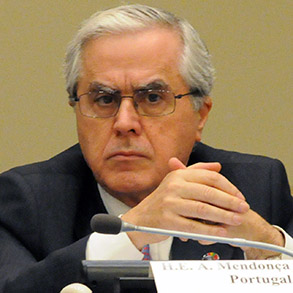
Álvaro Mendoça e Moura, Permanent Representative of Portugal to the UN, announced Portugal's plan to establish in the Azores an Atlantic International Research Center to provide an interdisciplinary platform bringing together space, climate, oceans and data sciences.
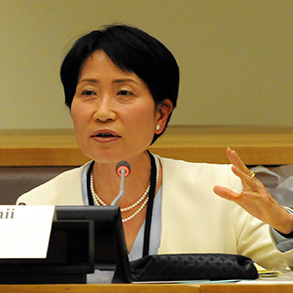
Naoko Ishii, CEO and Chairperson, GEF, expressed the GEF's interest in creating a multi-stakeholder platform to create a coherent framework for addressing the nexus of climate, oceans and the Blue Economy.
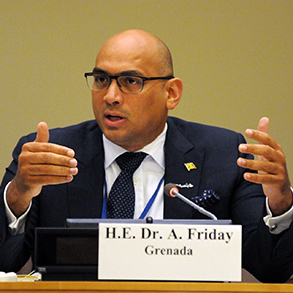
Angus Friday, Ambassador of Grenada to the US, discussed his country's work on a Blue Economy Master Plan and plans to create a Blue Economy Institute.

Panel (L-R):
Ronald Jumeau, Permanent Representative of Seychelles to the UN;
Naoko Ishii, CEO and Chairperson, GEF;
Angus Friday, Ambassador of Grenada to the US;
Biliana Cicin-Sain, President, WOF;
Álvaro Mendoça e Moura, Permanent Representative of Portugal to the UN;
Tiago Pitta e Cunha, CEO, Oceano Azul Foundation, Portugal;
Kees Rade, Ambassador for Sustainable Development, Netherlands; and
Inia Seruiratu, Minister for Agriculture, Rural Development and Natural Disaster Management, Fiji.
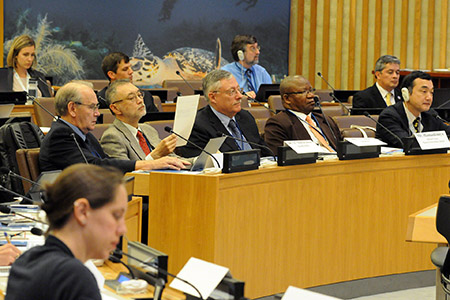
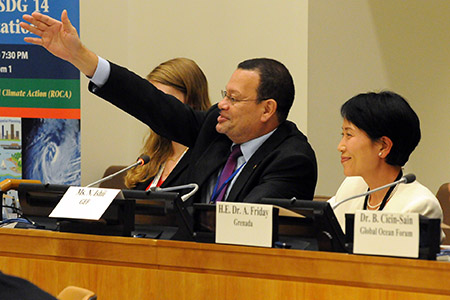
Contacts:
- Biliana Cicin-Sain (Global Ocean Forum) | bilianacicin-sain@globaloceans.org
More Information:
Blue Biotrade: Harnessing Trade and Investment for Sustainable Use
Presented by the UN Conference on Trade and Development (UNCTAD); Development Bank of Latin America (CAF); The UN Convention on International Trade in Endangered Species of Wild Flora and Fauna (CITES), and International Ocean Institute (IOI)
This event, moderated by Lucas Assunҫão, UNCTAD and Antonella Vassallo, Managing Director, IOI, discussed ways of adapting BioTrade (BT) principles for use in the marine realm.
Assunҫão introduced the session saying that the UNCTAD BT Initiative is a platform that has developed methodologies and standards for trade for the sustainable use of a wide range of biodiversity-based products. Vassallo stressed the importance of showcasing ways to adapt BT to the Ocean, through “Blue BioTrade,” and called for the creation of a community of practice.
Tundi Agardy, MARES Program, Forest Trends, said BT is distinct from other tools promoting sustainable use because it is the only one taking the whole value chain into account. She then stressed some difficulties in applying BT to the Ocean: lack of private property; resources beyond jurisdiction; and externalities not yet addressed in marine policies.
David Vivas Eugui, UNCTAD, spoke about approaches guiding BT and then presented the six principles on which BT is based and the challenges for developing new criteria for their adaptation to the marine environment: biodiversity conservation; sustainable use; equitable benefit sharing; socio-economic sustainability; legal compliance; and respect for actors’ rights.
Federico Vignati, CAF, explained his work in adapting BT to Latin America and presented examples of projects from the CAF’s new Blue BT portfolio, including restoration of ecosystem services from wetlands in Peru, and making pencils from seaweed as an alternate activity for the families of fishermen.
Daniel Kachelriess, CITES, gave an example of the recent successful management of the Queen Conch under these rules. He highlighted synergies between CITES and BT principles, and differences between the terrestrial and marine contexts, including national versus regional management, and diverse sources of data versus fisheries as the main data source.
Awni Behnam, Honorary President, IOI, highlighted, inter alia: Ocean governance must be an integral part of global governance; weaknesses and strengths of UNCLOS must be assessed; and blue economy and blue growth are different concepts since the core of the blue economy is sustainability, not growth.
In the ensuing discussion, participants discussed the place of science in CITES recommendations and the links between CITES and the negotiations on marine areas beyond national jurisdiction (ABNJ), among others.
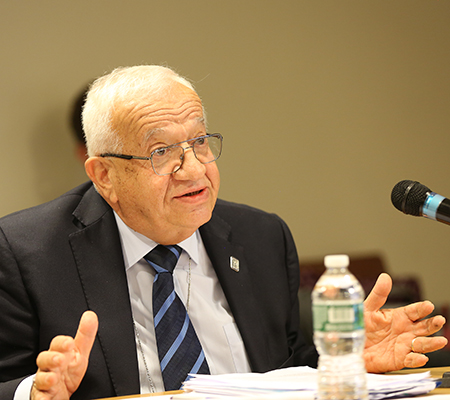
Awni Behnam, IOI, stressed the importance of integrating BioTrade to the discussions on a legally binding instrument on marine biological diversity in areas beyond national jurisdiction.
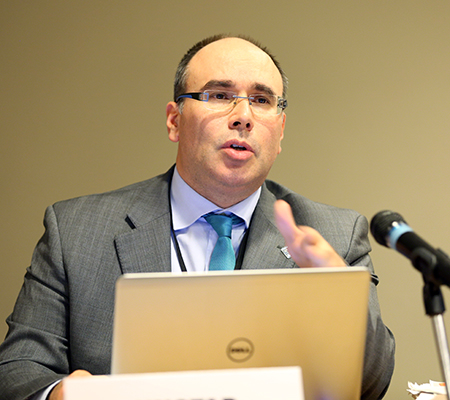
David Vivas Eugui, UNCTAD, spoke on how BioTrade principles could be extended to the marine environment.
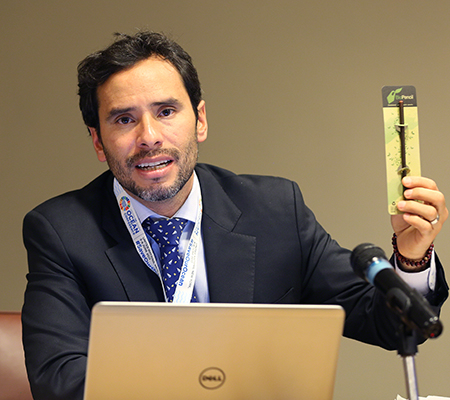
Federico Vignati, CAF, shows a blue BioTrade product: a pencil made from seaweed.
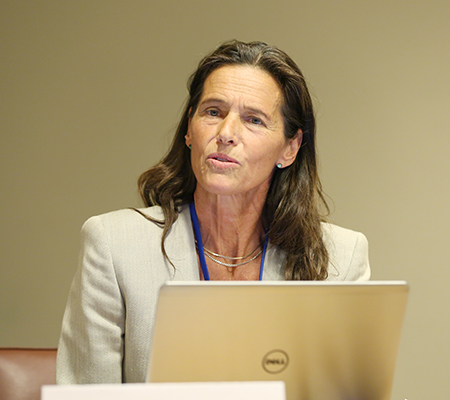
Tundi Agardy, Forest Trends, gave several examples of Blue BioTrade projects.

Panel (L-R):
Daniel Kachelriess, CITES; David Vivas Eugui, UNCTAD;
Antonella Vassallo, IOI;
Lucas Assunҫão, UNCTAD;
Tundi Agardy, Forest Trends; and
Federico Vignati, CAF.

Contacts:
- David Vivas Eugui (UNCTAD) | david.vivaseugui@unctad.org
- Federico Vignati (CAF) | fvignati@caf.com
- Daniel Kachelriess (CITES) | daniel.kachelriess@cites.org
- Antonella Vassallo (IOI) | antonella.vassallo@ioihq.org.mt
More Information:
Advancing SDG 14 and the Quest for a Blue Economy Through the Promotion of Socio-Economic Benefits for Developing Countries, Including SIDS, and Increasing Scientific Knowledge and Research Capacity: Perspectives on Deep Seabed Mining
Presented by the Governments of Tonga and Mexico, International Seabed Authority (ISA), UN Department of Economic and Social Affairs (DESA), and Tonga Offshore Mining Limited and Nautilus Minerals Ltd
Michael Lodge, Secretary-General, International Seabed Authority (ISA), moderated the meeting. Mahe’uli’uli Sandhurst Tupouniua, Permanent Representative of Tonga to the UN, said blue economy entails sustainable economy where activities such as seabed mining are in balance with the health of the ecosystem. He added Tonga is the first country in the world to have adopted a Mineral Seabed Act, which highlights Tonga’s initiatives to protect and preserve its marine environment and the deep seabed.
Sainivalati Navoti, DESA, speaking on behalf of Wu Hongbo UN Under-Secretary General for Economic and Social Affairs, noted that deep seabed represents 45% of the world’s area and UNCLOS will contribute to its just economic and social use.
Siosiua 'Utoikamanu, Tonga, said activities on deep seabed mining can contribute to: increasing government revenues from taxes and royalties from minerals; generating employment; and capacity building across multiple stakeholders on the potential and risks of seabed mining.
Mike Johnston, CEO, Nautilus Minerals, said the company is focusing its corporate social responsibility efforts on health, education, capacity building, infrastructure, collaborations and community partnerships.
Patrick Ho, Secretary-General, China Energy Fund Committee, spoke about the potential of blue economy for energy development, noting that the Ocean is a valuable source of renewable energy through the force of its tides.
Alejandro Alday, Mexico, said Mexico is progressing towards involvement in deep seabed minding activities. He stated that close collaboration with ISA is beneficial as it provides both capacity building and awareness raising opportunities.
Natalia Amezcua, Servicio Geológico Mexicano, presented the ISA Contractors Training Programmes, which provides operational skills development, improvement of scientific research, and capacity building. Among others, she stressed the need for long-term national plans and policies on sustainable marine mining.
In the ensuing discussion, participants raised issues related to, inter alia: the need to have national presentations on the benefits of seabed mining to ensure local buy-in; the risks brought by deep seabed mining; and the strong opposition to seabed mining by NGOs and many local communities.
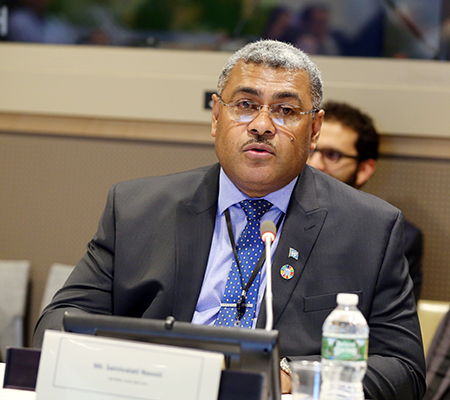
Sainivalati Navoti, DESA, said DESA will facilitate and organize a meeting on blue economy in the Pacific.
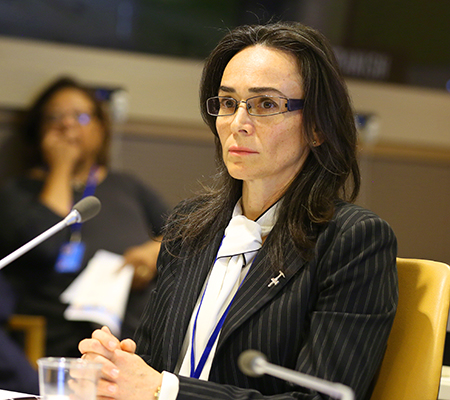
Natalia Amezcua, Servicio Geológico Mexicano, presented the ISA Contractors Training Programmes.
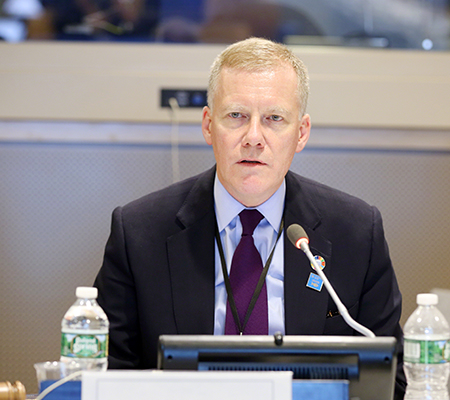
Michael Lodge, Secretary-General of the ISA, welcomed participants to the meeting.
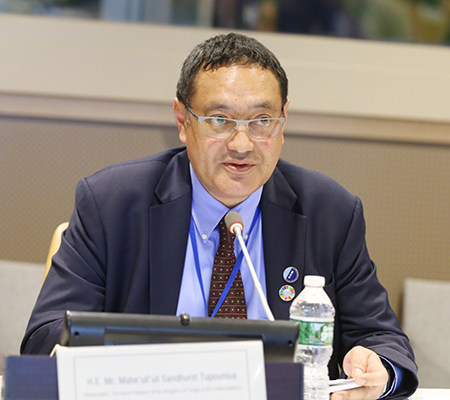
Mahe’uli’uli Sandhurst Tupouniua, Permanent Representative of Tonga to the UN, said Tonga is the first country in the world to have adopted a Mineral Seabed Act.
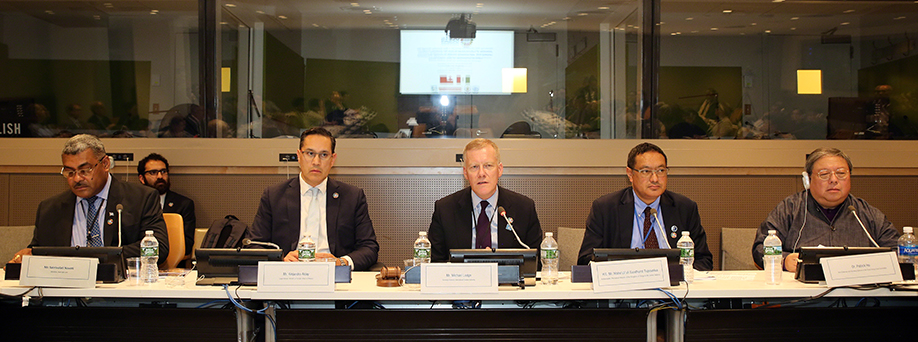
Panel (L-R):
Sainivalati Navoti, UN DESA;
Alejandro Alday, Ministry of Foreign Affairs, Mexico;
Michael Lodge, Secretary-General, International Seabed Authority (ISA);
Mahe ‘Uli’uli Sandhurst Tupouniua, Ambassador, Permanent Mission of Tonga to the UN; and
Patrick Ho, Vice Chairman and Secretary-General of the China Energy Fund Committee.
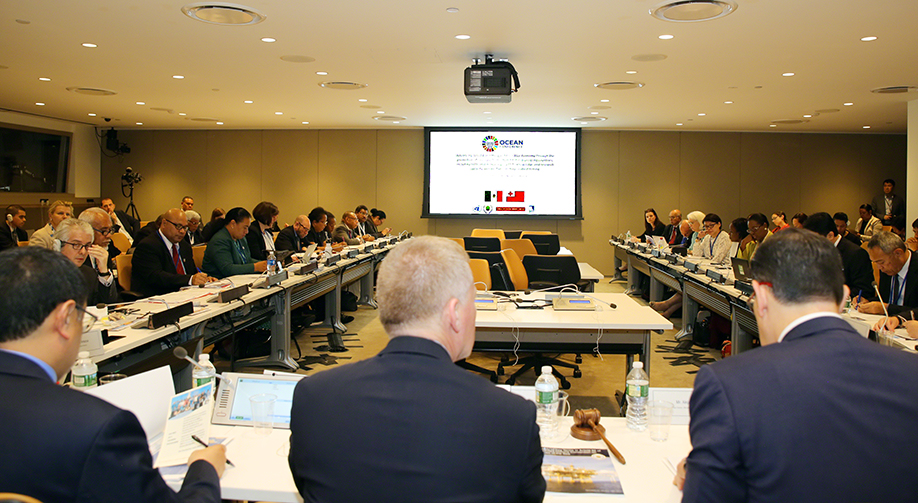
Contacts:
- Alfonso Ascencio-Herrera (Moderator Coordinator) | alfonsoa@isa.org.jm
More Information:
Financing Ocean Sustainable Development: The Investment Community and SDG 14
Presented by World Ocean Council (WOC), Sustainable Investment Forum, Ocean Assets Initiative, Sovereign Wealth Fund Institute, and Climate Bonds Initiative
Opening the session, moderator Paul Holthus, Founding President and CEO, WOC, highlighted the development of an Ocean investment platform that would bring together the Ocean community with industry and entrepreneurs to create solutions to Ocean-related challenges.
Explaining that US$52 billion is currently spent on conservation globally, John Tobin-de la Puente, Cornell University, said there is a need for US$200-300 billion per year to sufficiently address the problem, an amount he described as sounding “insurmountable” for governments. He underscored, however, the potential of the private investment market to fill this gap, which would amount to only 1% of all new and invested capital globally, noting that how to scale up conservation projects would be the most difficult question.
Speaking on reasons for investing in sustainable solutions for the Ocean, Simon Dent, Althelia Ecosphere, highlighted the potential for economic returns and associated environmental gains, underscoring that seafood is ten times more efficient than beef in terms of CO2 emissions.
Courtney Lowrance, Citi, spoke about the changing approach of sustainable finance, which no longer focuses only on “doing no harm,” and avoiding risk, but increasingly is now also a field of opportunities, particularly through green bonds.
Jacques Demers, Founder, Agawa Partners, said his organization’s private investment programme is focusing on two main areas: agri-food and the Ocean, underscoring the interlinkages between these two areas. He mentioned the need to revamp the coastal infrastructure, noting this could translate into “huge” opportunities for the investment industry.
Jayme Kurtyka, EagleRail Container Logistics, said leveraging finance required an approach that could quantify the long-term benefits in a way that makes good sense to investors. Specifically, he called for a focus on economic sustainability as well as environmental sustainability, to make sure the companies pursuing these initiatives can sustain their businesses.
Bill Staby, Co-Founder and CEO, Resolute Marine Energy, highlighted that there is a new generation of high net worth individuals “wanting to do good with their money.” He said it was important to consider scaling in terms of ensuring each individual product generates enough cash flow to finance the company, and underscored the need for agreed standards.
Naoko Ishii, CEO and Chairperson, GEF, spoke on opportunities, including from public-private partnerships, but cautioned on a process focused uniquely on scaling up existing products, noting that it was important to find new ways to address the problems we face. She underscored the importance of policies to create the enabling conditions for businesses.
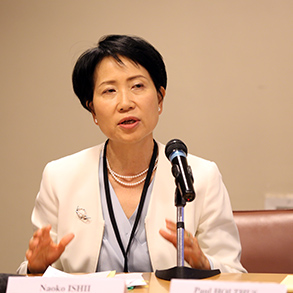
Naoko Ishii, CEO and Chairperson, GEF, said one way to ensure economic sustainability for businesses would be to get a critical mass moving in the same direction.
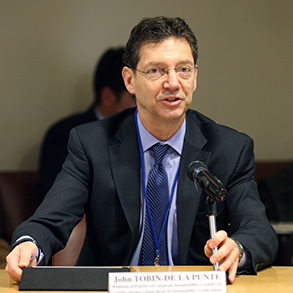
John Tobin-de la Puente, Cornell University, spoke on the Coalition of Private Investment in Conservation, launched in 2016, that aims to bring key actors together to develop ideas that would enable the necessary scaling up of private investment in conservation.
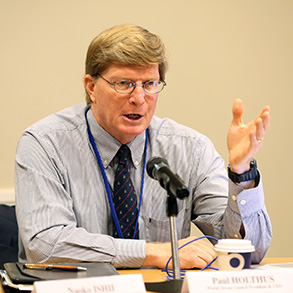
Paul Holthus, founding President and CEO, WOC, underscored the need to consider how businesses can interact and develop economies of scale on key issues and challenges.
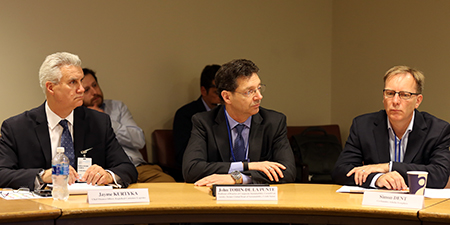
Panel (L-R):
Jayme Kurtyka, Eagle Rail Container Logistics;
John Tobin-de la Puente, Cornell University; and
Simon Dent, Althelia Ecosphere.
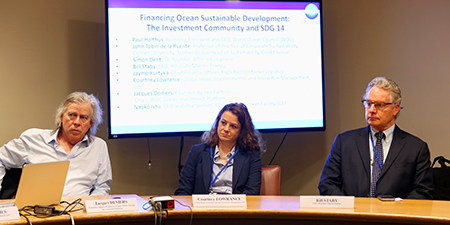
Panel (L-R):
Jacques Demers, Founder, Agawa Partners;
Courtney Lowrance, Citi; and
Bill Staby, Co-Founder and CEO, Resolute Marine Energy;
Contacts:
- Paul Holthus (founding President and CEO, WOC) | paul.holthus@oceancouncil.org